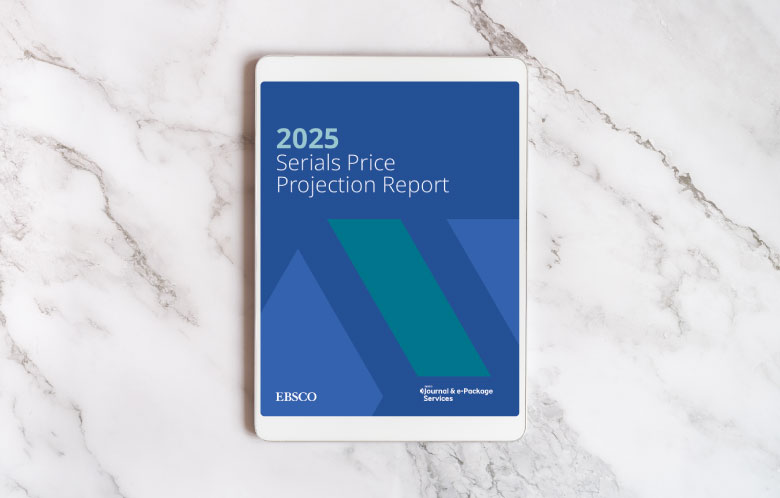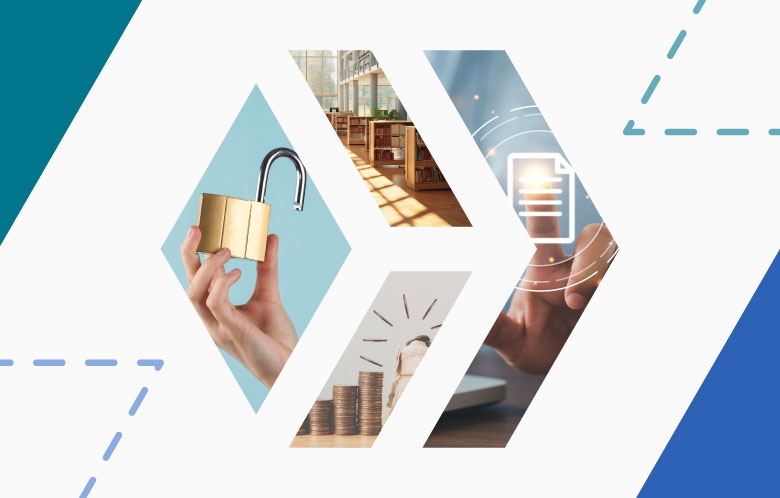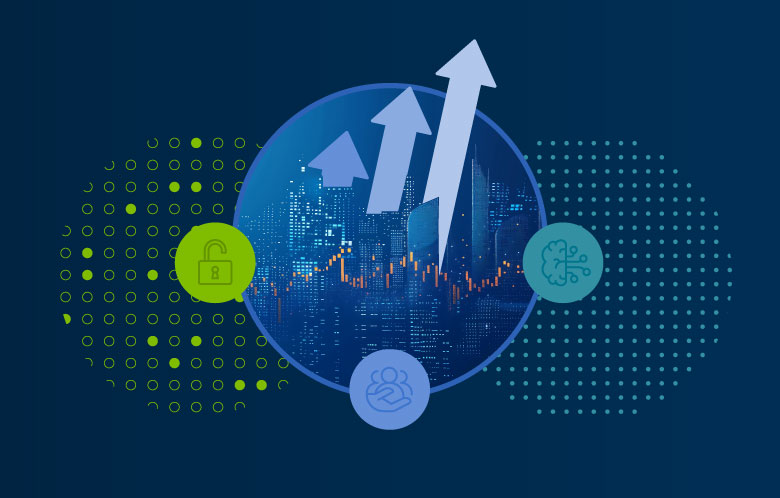Libraries today are more than repositories of knowledge—they are dynamic hubs facing a constant juggling act of managing digital collections, tight budgets, and limited staff resources. In the midst of these complexities, there’s a dedicated team making a huge impact: EBSCO’s Account Service Managers (ASMs). Although librarians and ASMs collaborate closely, the behind-the-scenes support that ASMs provide often goes unnoticed because it integrates so seamlessly into the library's daily operations.
Collectively bringing nearly a century of experience, 98 years to be precise, our ASMs are true partners in the trenches. They are not just problem-solvers; they are seasoned guides who understand the intricacies of library management. With backgrounds spanning academic, public, medical, and even corporate libraries, they’re equipped to handle nearly every issue thrown their way.
What sets EBSCO’s ASMs apart is their ability to tailor support to each library’s unique needs— whether it’s helping to manage vast journal collections spanning hundreds of titles, providing personalized training to new staff, or ensuring continuity when turnover happens. They take on some of the heavy lifting so that librarians can focus on what truly matters: serving their students, faculty, and patrons.
In this Q&A, our ASMs share stories from the field, revealing how they help libraries stay agile, efficient, and prepared for whatever challenges come their way. By drawing on decades of hands-on experience, they ensure that libraries can navigate today’s complexities with confidence and ease.
Click on any of the links below to jump directly to the section that interests you most.
- Knowledge Sharing and Consultative Benefits
- Analytics, Reporting, and Data Insights
- Subscription and Resource Management
- Training and Onboarding for Librarians
- Technical Integration and System Compatibility
Knowledge Sharing and Consultative Benefits
Q: Does EBSCO support knowledge sharing between libraries?
A: Yes, EBSCO actively supports knowledge sharing between libraries by sharing trends, solutions, and best practices, especially with those facing similar challenges. As an international company with a wide reach, we frequently see what's happening across different libraries and can offer insights that help libraries stay connected to broader industry practices.
With travel budgets shrinking, many libraries can’t attend as many in-person conferences where they would traditionally exchange knowledge. We see it as our responsibility to bridge that gap, helping to prevent libraries from becoming information-isolated. This resource-sharing empowers libraries to make informed, strategic decisions and stay updated on industry advancements, even from a distance.
Q: How does EBSCO help libraries preserve institutional knowledge?
A: We recently worked with a prominent library where three new staff members—handling e-resources, acquisitions, serials, systems, and access—were all new to library work. To complicate things, the previous librarian’s records were stored on a personal drive that had been wiped by IT, leaving no documentation. This meant the new team had to reach out to 130 different publishers just to retrieve login information and gather usage statistics, and they struggled to identify the metrics used for ACRL and IPEDS accreditation.
We’re seeing more libraries lose institutional knowledge as essential processes aren’t documented or are stored on personal devices. EBSCO provides continuity by maintaining organized records within EBSCONET, ensuring that even with staffing changes, libraries can access essential information and continue their operations smoothly.
Q: Why is EBSCO a unique partner for libraries?
A: Beyond subscriptions, EBSCO is a consultative partner. Our reps bring an extensive background within the information provision industry, sharing trends and best practices that might otherwise be out of reach. We’re here to support new librarians with training, helping them get comfortable managing electronic resources and tackling any troubleshooting that comes up.
EBSCO is also unique in that all our products are designed to communicate and integrate seamlessly, providing libraries with a comprehensive view of their collections. This interconnected system helps libraries manage their holdings more effectively, so they have accurate, up-to-date insights at their fingertips.
Q: How does EBSCO ensure librarians stay informed on industry changes?
A: We regularly update clients on trends, best practices, and new technologies through webinars, training, and one-on-one consultations, helping libraries stay ahead in a fast-evolving landscape. We want to make sure libraries have what they need and empower librarians so they can focus on serving students and faculty.
Q: What unique consultative benefits does EBSCO offer?
A: Our team has experienced librarians and industry experts who provide customized advice, help libraries troubleshoot issues, and optimize workflows, allowing libraries to better serve their schools. We really do a lot for our libraries:
- Customized Collection Management Strategies: We work with libraries to assess collection needs and recommend the most effective solutions, from subscription management to Open Access integration.
- Workflow Optimization: Our experts help streamline library workflows, identifying ways to save time on routine tasks, such as renewals, claims, and access management.
- Technical Troubleshooting Support: We assist libraries in resolving complex technical issues, including proxy configuration and access troubleshooting, ensuring seamless resource availability.
- Usage and Data Insights: EBSCO’s software offers detailed analytics, like cost-per-use and overlap analysis reports, helping libraries make data-driven decisions to optimize their resources.
- Staff Training and Onboarding: Our team provides hands-on training for new and existing staff on using EBSCO products, enhancing their ability to manage electronic resources confidently and independently.
- Best Practice Sharing: Leveraging our broad network, we share trends and best practices across institutions, helping libraries stay informed and adopt innovative approaches to common challenges.
Analytics, Reporting, and Data Insights
Q: What kind of analytics and reports does EBSCO provide?
A: EBSCO provides a range of reports that help libraries make well-informed, data-driven decisions. For example, we offer cost-per-use data and usage reports that clearly highlight which resources are most valuable. For titles purchased through EBSCO, our usage consolidation service merges subscription and usage data into a single, comprehensive view.
Additionally, our License Details Report offers an in-depth look at standard licenses for subscribed e-journals, making it easier for libraries to review terms at a glance. The Five-Year Historical Price Analysis by Title is another essential tool, helping libraries track pricing trends over time. This report is particularly useful for budgeting and for illustrating rising costs to university management. Each report is tailored to the specific needs of each library, ensuring that the insights are directly applicable to their unique collections.
Q: How does EBSCO handle usage data for resource planning?
A: Cost-per-use metrics are helpful for us when working with libraries to evaluate the impact of their resources. By looking at actual usage compared to their cost, we can help libraries figure out where to get the most value. Sometimes that means reallocating budgets to the resources students and faculty rely on most, or exploring options like interlibrary loans or document delivery to fill in any gaps. It’s all about using that data to make budgeting decisions that maximize the impact of the collection.
Q: What distinguishes EBSCO's overlap analysis report?
A: Overlap analysis helps libraries identify duplicated content across resources, such as journals available in multiple databases. By highlighting redundancies, the report assists in cost-saving decisions, like retaining only essential subscriptions and managing access to current and archival content.
Q: Why is having an archive of subscription history valuable, and how do libraries benefit from accessing this data?
A: EBSCONET keeps an archive of order history going back multiple years which you can easily access at the title level. This quick view into order history assists with triage of access issues. It can be a source for confirmation of order history when a title moves from one publisher to another.
For current renewals, this data helps libraries stay updated on any changes, like titles being added or removed from packages, ensuring they are fully aware of publisher adjustments. Beyond that, having a detailed subscription history allows libraries to confirm post-cancellation access to e-journal holdings and retain access to content they've already paid for.
Ultimately, keeping accurate order history helps librarians maintain their knowledge base, making it easier to support students and faculty effectively.
Subscription and Resource Management
Q: Are there challenges in supporting digital packages and transformative agreements?
A: Yes, some libraries may see e-packages as easier to handle independently. But due to staffing cycles, libraries often come back to EBSCO for support, especially when resources are stretched thin. We offer expertise, particularly for complex package renewals and technical setups.
Q: Could you explain how e-package (vs. individual titles) renewals work and what sets them apart?
A: Some e-package renewals are managed through a separate interface because they’re unique, with pricing customized for each institution (because each Library will have different titles). These packages require special handling due to their distinct nature. Additionally, the interface includes a three-year archive, allowing libraries to review subscription history and track changes over time.
Q: How does EBSCO help libraries adapt to changing subscription models?
A: Subscription models can change with budgetary cycles, new publishers, or internal policy changes. Our teams keep libraries informed of these shifts, advise on potential cost-savings, and ensure uninterrupted access to resources. A few examples of subscription models include:
- Packages: Title listing for two or more serials that are purchased as a package at a single rate and often comes with ‘access only’ titles ie. you get additional titles for free when you pay for specific titles.
- Database model: One price per one set list with no changes and no individual prices. The publisher can make changes to that package, and it typically happens at renewal time.
- Swap/drop/add: You select a predetermined number of titles and will get a number of non-priced titles. Libraries must maintain a certain spend threshold over the contract period. May have required titles called “Maintained Titles”.
- Pick your package: Libraries can pick and choose a custom list and it will be treated as a package.
- Developing models: Read and publish where you purchase a set of journals and you’ll also get Open Access journals and paid titles.
- Subscribe to open: If enough libraries subscribe to meet the cost of publication, the title will be open access for the remainder of the year. This resets every year.
Q: Why do libraries choose EBSCO over direct subscriptions with publishers?
A: When purchasing direct to publisher there are benefits and drawbacks. You’ll have multiple checks, varying currencies, and purchase orders, multiple customer service contacts, specifically, one for each publisher and multiple renewals. Often there are cost savings because you will do all of the activities without the help of a vendor.
While there can be some cost savings, handling these tasks without vendor support adds significant complexity:
- Increased Administrative Burden: Coordinating separate orders, renewals, and payments across numerous publishers requires substantial time and careful tracking. Even a small oversight can lead to missed renewals or service interruptions.
- Multiple Points of Contact: With each publisher as a separate entity, libraries must navigate multiple customer service teams, making it harder to resolve issues quickly or maintain consistent support.
- Challenging Financial Management: Processing payments to various publishers, often in different currencies, adds complexity to budgeting and financial forecasting, especially for libraries with limited accounting resources.
- Time-Intensive Renewal Process: Renewing directly with publishers means managing each contract individually, often leading to overlapping or confusing renewal periods and adding layers to an already time-consuming process.
Q: What does EBSCO do to simplify the renewal process?
A: EBSCONET’s renewal interface is intuitive and efficient. For librarians not making changes to their renewals, it’s as simple as reviewing titles and checking out. Libraries can see all titles in their cart, make selections, and view changes through the renewals detail report, which tracks adjustments by title, format, and pricing for easy reference.
Q: How does EBSCO support libraries in budget planning and inflation management?
A: Each year, EBSCO helps libraries navigate budget planning and inflation by publishing our Serials Price Projection Report and five-year price analysis. These reports give libraries insights into expected cost trends, so they can better plan and allocate resources. We work closely with publishers to provide price projections, giving libraries a heads-up on what to expect in the upcoming renewal season.
Q: How does EBSCO help experienced library staff save time for their other responsibilities?
A: As an example, we work with a school where the serials clerk has over 15 years of experience and can handle all the tasks we support. However, if she managed everything herself, it would take up valuable time that could be used for responsibilities like updating title changes in the catalog. By handling many of the routine tasks, we free up time for seasoned staff to focus on higher-priority activities that benefit the library.
Additionally, we keep experienced staff informed about new technologies, like renewal integration APIs and EDI invoices, which can add efficiencies to their workflow. This way, they can leverage the latest tools to streamline operations even further, making their day-to-day work smoother and more efficient.
Q: What value does EBSCO bring to libraries with limited staffing?
A: EBSCO’s support enables understaffed libraries to focus on user-facing tasks. We handle complex subscription issues, database updates, and access management, which would otherwise consume valuable staff time.
Q: Can you provide an example of the significant time savings EBSCO offers libraries?
A: Without an agent, libraries would need to place individual orders with hundreds of publishers, which means handling renewals, invoicing, and payments separately for each. In contrast, EBSCO consolidates these orders, reducing the number of transactions significantly.
For example, a library might have 200–300 different publishers in their renewal cart; managing each one individually would be incredibly time-consuming, especially with international orders involving exchange rates and specific SWIFT codes. By centralizing these tasks, we free up substantial time for library staff.
Q: When you take over an account with complex or outdated processes, how do you work to improve efficiency and streamline operations?
A: Sometimes we find that certain workflows persist simply because "that’s how it’s always been done." We aim to uncover these areas, asking detailed questions to understand their current process fully. By collaborating with library staff, we identify ways to simplify and enhance their workflows, making operations more efficient and tailored to today’s needs.
Q: How does EBSCO support libraries when they face staff turnover?
A: Institutional knowledge often leaves with retiring or transitioning staff. EBSCO steps in to bridge this gap, providing continuity and support for new staff. This helps them navigate subscriptions, databases, and other critical resources. Staff turnover can disrupt resource management. EBSCO holds historical data on subscriptions and vendor interactions, allowing us to seamlessly assist new staff members with accurate, up-to-date information.
Q: Why is it important that you make early introductions to our customers?
A: We want to meet them because we want to handle the account the way the customer wants it to be handled. For example, “are you doing things a certain way (with pervious vendor) because it was a requirement or is there another way you want things done?” By asking these questions early on, we can tailor our approach to fit their needs, ensuring a smooth transition and a partnership that aligns with their goals from the start.
Q: How does EBSCO assist libraries with accreditation needs?
A: Accreditation bodies often require extensive documentation on library resources. EBSCO aids in maintaining resource lists, usage metrics, and access details, which simplifies compliance and supports accreditation efforts.
Q: How does EBSCO assist when libraries need to claim missing journal issues?
A: Instead of librarians having to contact multiple publishers individually, EBSCO consolidates these claims, simplifying the process and ensuring timely resolutions. Plus, librarians have full visibility into any publisher responses to their claimed issues, so they’re always in the loop on the status of their requests. This streamlined approach not only saves time but also keeps everything transparent.
Q: What challenges do libraries face when managing e-packages on their own?
A: We’ve seen some libraries choose to manage e-packages directly with publishers, but many eventually return for our support as demands on their staff increase. EBSCO’s team is equipped to handle recurring issues efficiently, which can reduce the strain on library staff and minimize the need for additional personnel.
Q: How does EBSCO respond to complex resource management challenges?
A: EBSCO frequently supports libraries by addressing huge data cleanup and configuration needs. From restructuring subscriptions to consolidating records across departments, our team helps libraries modernize workflows and optimize collection management, ensuring each resource meets institutional needs effectively.
Q: How does EBSCO handle price-focused concerns in partnerships with libraries?
A: We believe that a strong partnership isn’t just about cost—it’s about aligning our services with a library’s unique needs. If price is a concern, we encourage an open conversation to discuss the specific goals and any gaps that have been identified. From there, we are happy to review the services the library is currently utilizing to ensure efficient workflows.
Together, we can pinpoint any adjustments needed in the existing service portfolio or suggest new solutions that could enhance operations. This approach allows us to provide tailored support that goes beyond just cost, ensuring a successful, long-term partnership that truly benefits the library.
Training and Onboarding for Librarians
Q: Could you walk us through the initial introduction to EBSCONET? What key areas do you focus on, and what are you looking to learn from the library team during this call?
A: In introductory calls, we assess the librarian's familiarity with EBSCONET and serials management. We start by asking questions to understand their current workflow: Do they need a list of current orders? Are they familiar with placing claims? What kind of reports have they used before? We also ask if there’s anything missing from previous reports they’d like added. By gathering these insights, we tailor our setup and training to ensure EBSCONET fully supports their needs.
Q: What features of EBSCONET tend to excite users the most during your walkthrough?
A: Users often comment on how intuitive and user-friendly the EBSCONET platform is. One new customer, after an overview, remarked that she no longer has to spend so much time “doing all of that detective work on my own.” Additionally, during a typical one-hour walkthrough, we frequently hear, “Oh, this is great!”—especially when we cover the renewal process. If no changes are needed, the renewal is as simple as reviewing the title list and checking out, which is something they really appreciate.
- All-in-One Hub: Beyond renewals,EBSCONET is a true “one-stop shop” for subscriptions, consolidating and centralizing all information in one place. The title file provides a wealth of information on a single screen, with an in-line tabbed display that includes Order Details, Access and Registration, License Details, Holdings Analysis, Usage, Title History, and Order History. Every piece of data related to a title is tracked, and changes are proactively “pushed” to users, so they don’t have to search for updates—EBSCONET serves up relevant information to support overall management and decision-making.
- Intuitive Navigation: Users appreciate the platform’s seamless linking across different areas, making it easy to navigate from an Order’s “Service Request” tab directly to the Customer Service Portal or drill down into details from any report or search result.
- Holistic Insights: EBSCONET allows for a detailed view at the individual title level and also provides a “bird’s eye view” across all subscriptions for key data points via customizable, on-demand reports that can be exported immediately. Users can search both individual title orders and entire e-package orders, with the flexibility to drill down to detailed, granular information when needed.
- Shared User Access: Important information, such as service requests and resolutions, is accessible to all authorized users, ensuring nothing is “hidden” in an email inbox.
- Persistent Records: EBSCONET also maintains continuity by storing historical data—like Order History, Title Change History, and Customer Notes—which remains easily accessible, even with staff turnover.
All of this comes together in an interface that users find clean, detailed, and flexible, with cart summaries and report features that are searchable, sortable, and exportable to Excel, allowing for adjustments offline and a smooth return to EBSCONET when ready.
Q: How does EBSCO support new librarians who are managing collections for the first time?
A: We understand that stepping into collection management can be overwhelming, especially since we see close to one-third of new librarians (in libraries we work with) have either never worked in a library or lack a traditional librarian background.
EBSCO has a structured onboarding process, beginning with an introduction to our services and a transition document outlining timelines for setting up accounts, managing renewals, and accessing EBSCO resources.
For those without a background in technical services, subscription management can be particularly challenging, so we prioritize frequent check-ins—often weekly—and offer a variety of trainings and webinars to guide them through each step. Our team walks librarians through each phase, ensuring they’re comfortable with tools like EBSCOhost and EBSCOadmin, and we encourage them to reach out whenever they need support.
Q: What training does EBSCO offer for librarians new to serials and e-resources?
A: EBSCO offers comprehensive training, including an “Introduction to Serials” course and sessions focused on electronic resources. These vendor-neutral sessions help new librarians understand basics and advanced topics, from licensing to Open Access trends, ensuring they have the skills to manage complex resources.
Technical Integration and System Compatibility
Q: What if a library faces technical issues with journal access?
A: While things like proxy server configurations are managed by the library or institution, EBSCO assists with other technical access issues that libraries may encounter. Our representatives work proactively to resolve access problems by collaborating with publisher partners. This includes providing proof of payment, confirming IP addresses, and ensuring access is restored promptly. If librarians need to update or change IP addresses, they simply report it to EBSCO, and we handle notifying the publishers. This ensures seamless, uninterrupted access to library content, allowing staff to focus on supporting their academic communities.
Q: Can EBSCO integrate with libraries' ILS (Integrated Library Systems)?
A: EBSCO’s integration capabilities allow for data transfer between EBSCO subscription services and ILS platforms like FOLIO and Alma. This saves libraries significant time in maintaining order records and enhances the accuracy of ILS data, providing real-time updates to collection records and supporting efficient resource management.



